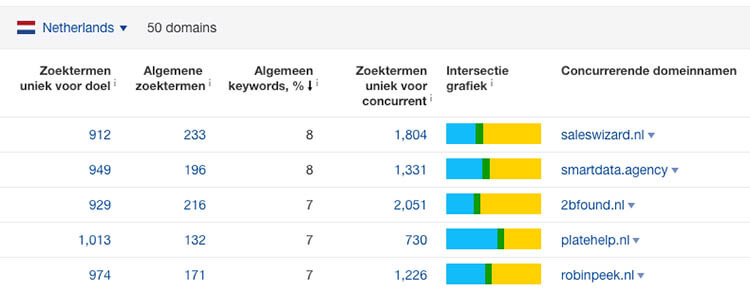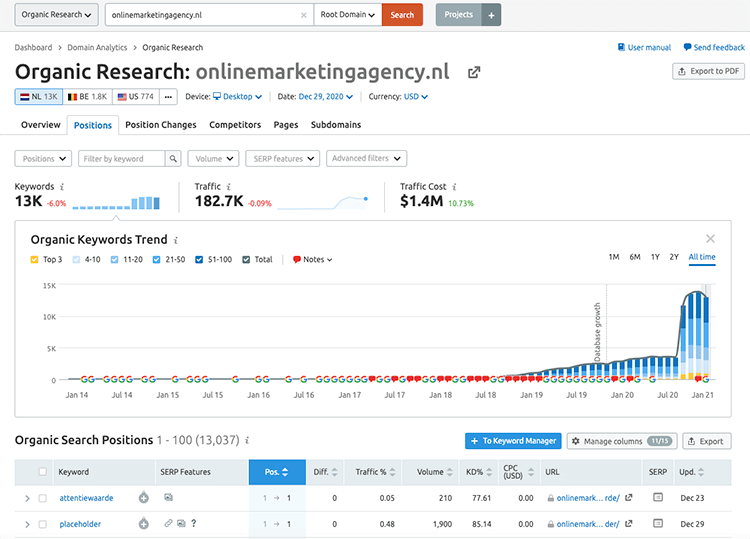Menu
Table of contents
'Plumber Arnhem'. But what if your competitors have been doing SEO for years?
And what if those competitors have already put thousands of dollars into SEO work and are terribly findable?
Totally beautiful!
After all, you can take advantage of that yourself by finding out their keywords, for example. This will save you work (and costs!) and you can immediately focus on creating content and making your own company more findable.
I'll help you get started with 6 ways you can find out competitor search terms very easily. In half an hour.
But first: what are keywords?
Search word, keyword, keyword, search phrase, search term or keyword. It all means the same thing.
A keyword is a word, or several words, that a visitor types into Google for the purpose of finding the right information. That's it.
That's all it is.
It's not about volume, relevance or length. These are only things that come around the corner in a good keyword.
Fun fact: did you know that 20% of keywords typed in have never been typed in before?

Why keywords & a keyword research is so important
A keyword research and then corresponding keywords are the foundation of any SEO content strategy. Because suppose you have a really cool idea to write about.
Namely, your favorite hobby: fitness with your own body weight (this was my hobby for many years, but that aside).
Since you have been doing this for a few years, you enjoy writing about it. But did you know that fitness with your own body weight is also called calisthenics or street workout?
And did you also know that there are:
- An average of 10 searches per month in Google in the Netherlands for "Fitness with your own body weight.
- 'Street workout' is searched on average 490 times a month in Google in the Netherlands.
- An average of 15,400 searches per month on "Calisthenics" in Google in the Netherlands.
With the above information, which keyword would you choose? I would go with the keyword "Calisthenics" and later the keyword "Street workout.
Logical, right? What I want to explain with the above example is that keywords can make or break your texts.
Without a strategy, without a plan, you're never going to score well. Therefore, before you start writing, it's important to figure out what you want to score on and how you want to do it.
And now I hear you thinking: So how do you figure out the best keywords? I've already written a blog about that.
Namely: Here's how to determine the best keywords.
Tooltip: My favorite tool to find out keywords is KWfinder, highly recommended and totally free.
Here's how to find out the keywords used by your competitors
Now we come to the real work! You now have enough prior knowledge and so I can show you 5 ways how to find out your competitors' search terms.
I do this in order. In order of the method I am the most fan of in order of which one I use the most.
We'll start with my ultimate favorite: Ahrefs.
1. Tracking keywords with Ahrefs (1/2)
If you read my blogs more often, then you know that I am super fan of Ahrefs. For example, you already read about it in my tips for a rock-solid link profile, or in the article on link building or maybe in the ways to find out how high you rank in Google.
Ahrefs is a boss program and if the budget is sufficient, definitely purchase it. When you log into Ahrefs, you can enter a domain at the top.

Always make sure that the domain you enter matches the live domain. What I mean by this is: if your website does not contain a www, do not enter it.
Then click on "Competing domain names" in the list on the left. Et voilà, all parties that have overlap in content.
Now by simply clicking on the numbers, you can see your competitors' search terms.

Click in the 'Search terms unique to target' row to see the search terms that you rank for, but your competitor does not. Click in the 'Common search terms' row to see the search terms that both you and your competitor rank for.
And click on "Search Terms Unique to Competitor" to see the search terms your competitor scores on and you don't. A child can do the laundry.
Tracking keywords with Ahrefs (2/2)
Within Ahrefs, you can access data in many different ways, and so can your competitors' search terms.
You can also enter the domain of your competitor in Ahrefs and when you then click on 'Organic search terms' in the menu on the left, you will immediately see all search terms of that competitor. And we are really talking about ALL search terms.
And if you want to know what that data looks like in Excel, you need to click on the download below.
Bol.com exports Ahrefs organic search terms
2. On Page SEO view: Meta descriptions, titles, headings, etc.
When you are well on your way with SEO, the keyword you chose for that page is in the meta description, meta title, the H1, the H2, the alt text and the URL. In other words, in all the On Page SEO elements.
This is true for you, but also for your competitors. By looking at those elements, you can immediately see what terms they are focusing on.
In fact, the keyword is almost always at the front of the meta title. For example, I dare you to tell me right away that the keyword in the snippet below is "Webdesign Amstelveen.

An easy way to find out all these On Page SEO elements is the Mozbar. This Chrome extension allows you to find out the On Page SEO elements of that page with 1 click of a button.
Check it out!

3. Spying with Spyfu
Over the past few years, I have become less of a fan of Spyfu. To my mind, the tool shows less and less, especially when you don't have a paid account.
Spyfu is similar to Ahrefs, only of lower quality. The advantage of Spyfu, however, is that you can use the tool once a day for free.
This is not possible at Ahrefs. When you have entered a domain at Spyfu, I can see what the keywords are under the heading "SEO Keywords.
What I do think is cool about Spyfu is that you can select by the most important keywords, new keywords, risers, fallers, page 1 keywords, etc., among other things.
4. Internal linking can link your keywords
Internal linking is actually done for two reasons:
- Further help/direct the visitor.
- Making pages more findable by Google within your website.
And about the latter, that's what we're going to talk about now. Google should be seen (in this case) as a human being.
Suppose you give a human the command: find page X within this website. If that page cannot be found easily and within a few clicks, neither can Google.
For that reason, internal links are very important. You can make sure that the pages you want to be found better get a boost.
That is precisely why internal links can link important keywords. Because it is so obvious that parties want to score with those words.
I do it too, you know! After all, internal link building is terribly important.
And if you go to my website, you'll see them too:

5. Keyword density (SEOquake).
Keyword density is no different than how many times a keyword is mentioned in a text. Do you have a 100-word text and it contains the keyword 3 times?
Then you have a keyword density of 3%. We won't go into what the ideal keyword density is right now, but you can get a lot of information out of it.
Because, common words ... will be words someone wants to score on.
Except for words like "a," "the," "it," "and," etc.! Keyword density can be found out with 101 tools.
But since I told you about SEOquake before, do think it's a good idea to use that Chrome extension again as well.
How does SEOquake work?
If all goes well, you already have the Chrome extension installed. If not, just do it quickly.
And then go through the following steps:
- Go to the competitor's website/page.
- Click on the SEOquake icon among your Chrome extensions.
- Then click on "Density.
Now you will see a whole list of the keywords used on that page, how often they are used and what the density is.

Tip: On the right side, you can also specify if you want to find out keywords that are longer than 1 word.
6. SEMrush to find out keywords from competitors
Besides Ahrefs, there is another SEO tool that allows you to get incredibly good competitor keywords. That is, namely, SEMrush.
SEMrush, like Ahrefs, is a paid program, but well worth its money. Tracking competitors' keywords is as easy with SEMrush as it is with Ahrefs.
All you have to do is enter a URL and that's it.
When you are logged into SEMrush you need to click on 'Organic Research' on the left side of the row. Then enter your competitor's URL there and ready on 'Search'.
If you then click on "Positions" and scroll down a little you will see all of your competitor's keywords.

Now you have to get to work!
I have now given you all the tools, tips and tricks to find out your competitors' keywords. Now it's up to you to pick the best keywords to beat your competitors with.
Good luck!
This article was written on April 10, 2019 and updated on December 31, 2020.











Written by: Daniel Kuipers
Daniel is the founder of Online Marketing Agency. He constantly scours the Internet for the latest gadgets and tactics and blogs about them in understandable language. Well, sometimes.